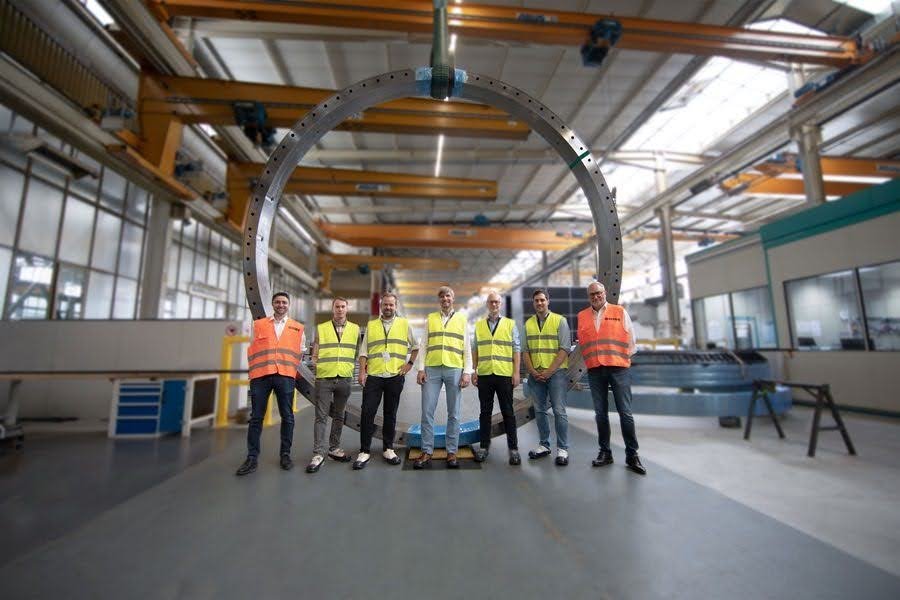
December 6, 2024
Photo Caption: The inspection and approval of the individual rings of the combined roller and ball slewing bearing: (from left) Michael Sander (Liebherr-Components Biberach GmbH), Alexander Volgmann (DB InfraGo AG), Tobias Killmann (DR. SCHIPPKE + PARTNER mbB), Alexander Krölls (Adam Hörnig Baugesellschaft mbH & Co. KG, Matthias Längle (mlIng GmbH), Andreas Menzel (MCE GmbH), Ralf Hanke (Liebherr-Components GmbH).
Liebherr’s components product segment supplies the heart of the rotating pillar for the bridge Friesenbrücke, which is being erected for Deutsche Bahn in Weener. It comprises a 5-meter, 12.5-ton combined roller and ball bearing along with eight matching pinions. This rotating pillar and the associated mechanical systems by Hermann GmbH Maschinenbautechnologie support the 145 meter long, 1,800-ton central section of Europe’s largest lifting swing bridge to date.
This is what the Friesenbrücke will look like upon completion.
The Friesenbrücke is the key part of the 173-kilomet-long rail route between Groningen and Bremen. “With its total length of 335 meters, it is the largest lifting swing bridge in Europe, carrying not only rail traffic, but also footpaths and cycle lanes,” says Alexander Volgmann from Deutsche Bahn. “The bridge spans the river Ems and opens the way for ships by rotating up to 90 degrees. This is where Liebherr’s slewing bearing and pinions come into play.”
The combined roller and ball bearing along with eight matching pinions ensure that the bridge can rotate on its central pillar. “The technology used here is a lift-and-rotate mechanism. First, the rotating section of the bridge is unlocked. The central section is then lifted by the rotating pillar, releasing it. Finally, the hydraulic drive and the slewing bearing swivel the bridge,” explains Karl Völkl from Hermann GmbH Maschinenbautechnologie, the supplier of the rotating pillar for the Friesenbrücke.
This is what the slewing bearing and pinions will look like once installed.
The bridge section will be rotated around 1,850 times a year. To support optimum operating times, Liebherr has designed the slewing bearing for a service life of 100 years and verified it by a finite element (FE) analysis. Moreover, the bearing has been coated with a C5 anti-corrosion layer, specifically designed for use in or near water.
“Additionally, our intelligent bearing clearance monitoring system measures wear on the axial raceway, allowing efficient monitoring and maintenance of the bearing,” explains Michael Sander, technical sales engineer for slewing bearings at Liebherr-Components in Biberach (Germany).
This solution integrates sensors directly into the bearing, with the measurement results fed directly into the customer’s system. “The seamless integration into the customer’s control system is a key innovation. We provide a specially developed and protected code, allowing the customer to integrate the data into their own system, using their own logics and interface,” adds Sander. No additional gateway is required, reducing system complexity thanks to the software-integrated bearing clearance monitoring system.